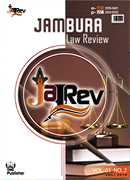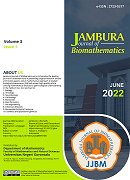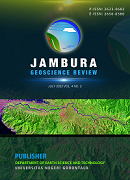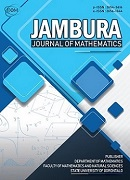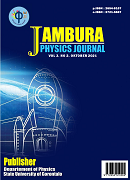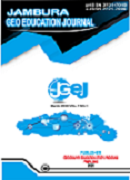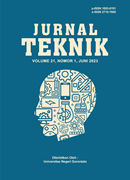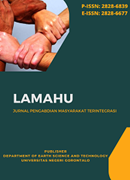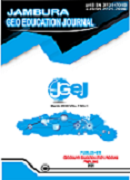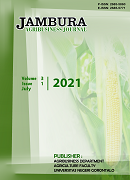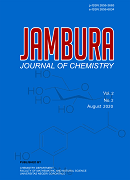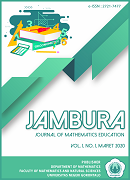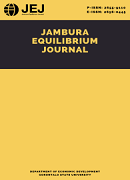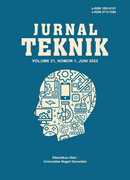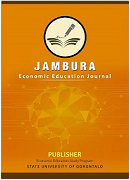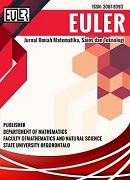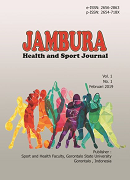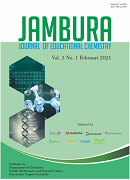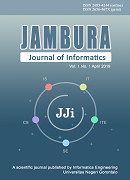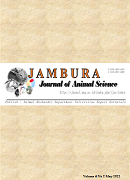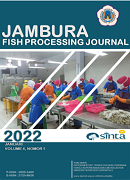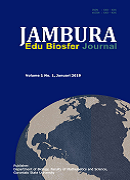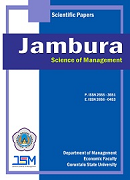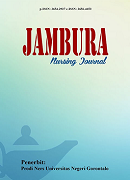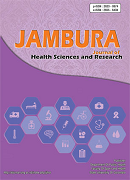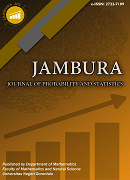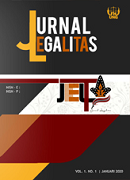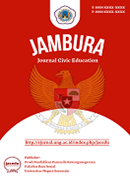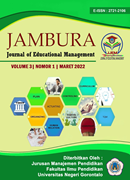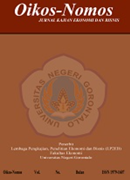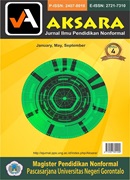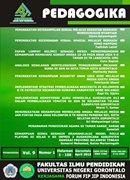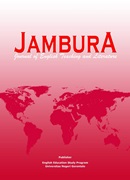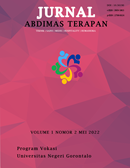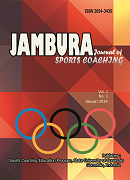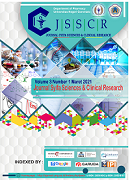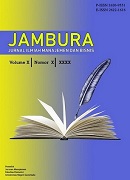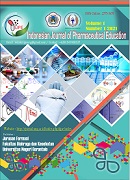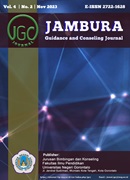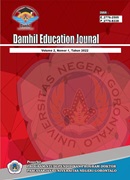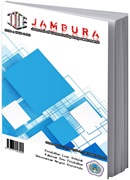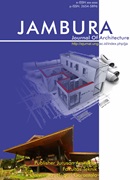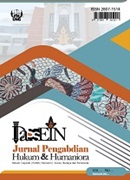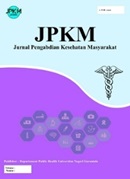Selamat datang di website Jurnal Elektronik Universitas Negeri Gorontalo. Universitas Negeri Gorontalo saat ini memiliki jurnal yang telah terakreditasi dan terindeks di database SINTA, Kementerian Pendidikan Kebudayaan, Riset dan Teknologi RI. List Jurnal UNG terindeks SINTA.
JURNAL TERINDEKS SCOPUS/SINTA 1
JURNAL TERINDEKS DOAJ
JURNAL TERINDEKS SINTA 2
JURNAL TERINDEKS SINTA 3
JURNAL TERINDEKS SINTA 4
JURNAL TERINDEKS SINTA 5
LIST JURNAL TERBITAN UNIVERSITAS NEGERI GORONTALO
A B C D E F G H I J K L M N O P Q R S T U V W X Y Z All
Jambura Axon Journal
View Journal | Current Issue | Register
Jurnal Riset dan Pengabdian Interdisipliner
View Journal | Current Issue | Register
Charitra : Journal of Local History Studies
View Journal | Current Issue | Register
Kalyanamitra : Journal of Archeological Resource Management
View Journal | Current Issue | Register
Jambura Journal of Biomathematics (JJBM)
View Journal | Current Issue | Register
Jambura Law Review
View Journal | Current Issue | Register
Jambura Journal of Mathematics
View Journal | Current Issue | Register
Jambura Journal of Mathematics Education
View Journal | Current Issue | Register
Jambura Journal of Chemistry
View Journal | Current Issue | Register
Jambura Journal of Educational Chemistry
View Journal | Current Issue | Register
JAMBURA GEO EDUCATION JOURNAL
View Journal | Current Issue | Register
Jambura Geoscience Review
View Journal | Current Issue | Register
Euler : Jurnal Ilmiah Matematika, Sains dan Teknologi
View Journal | Current Issue | Register
Jambura Physics Journal
View Journal | Current Issue | Register
Jambura Edu Biosfer Journal
View Journal | Current Issue | Register
Jambura Journal of Informatics
View Journal | Current Issue | Register
Jambura Economic Education Journal
View Journal | Current Issue | Register
Jurnal Pengabdian Sains dan Teknologi
View Journal | Current Issue | Register
Jurnal Studi Ekonomi dan Pembangunan
View Journal | Current Issue | Register
Jambura Journal of Electrical and Electronics Engineering
View Journal | Current Issue | Register
Jambura Health and Sport Journal
View Journal | Current Issue | Register
Jambura Journal of Animal Science
View Journal | Current Issue | Register
Jambura Fish Processing Journal
View Journal | Current Issue | Register
Jambura Agribusiness Journal
View Journal | Current Issue | Register
Jambura Science of Management
View Journal | Current Issue | Register
Jambura Nursing Journal
View Journal | Current Issue | Register
BAKEMAS : Jurnal Pengabdian Kesehatan Masyrakat UNG
View Journal | Current Issue | Register
Jambura Pendidikan IPA
View Journal | Current Issue | Register
Jambura Journal of Health Sciences and Research
View Journal | Current Issue | Register
Jambura Arena Pengabdian
View Journal | Current Issue | Register
Jambura Arena Sport
View Journal | Current Issue | Register
Jambura Journal of Probability and Statistics
View Journal | Current Issue | Register
Jambura Journal of Sports Coaching
View Journal | Current Issue | Register
JURNAL LEGALITAS
View Journal | Current Issue | Register
Litosfer: Jurnal Riset Mahasiswa
View Journal | Current Issue | Register
Jambura Journal of Urban and Regional Planning
View Journal | Current Issue | Register
Jambura Equilibrium Journal
View Journal | Current Issue | Register
Public Health and Surveillance Review
View Journal | Current Issue | Register
Media Pengabdian Kesehatan Indonesia
View Journal | Current Issue | Register
Journal Syifa Sciences and Clinical Research
View Journal | Current Issue | Register
Journal Health & Science : Gorontalo Journal Health and Science Community
View Journal | Current Issue | Register
Vector : Journal of Physics Education and Science
View Journal | Current Issue | Register
Jambura Proceedings of Sciences and Education
View Journal | Current Issue | Register
Journal of Economic and Business Education
View Journal | Current Issue | Register
Jambura Journal of Food Technology
View Journal | Current Issue | Register
Civic Education Law and Humaniora : Jurnal Pengabdian Masyarakat Terintegrasi
View Journal | Current Issue | Register
BASTRASIA: Jurnal Bahasa, Sastra, dan Pembelajarannya
View Journal | Current Issue | Register
Journal of Applied Geoscience and Engineering
View Journal | Current Issue | Register
Jurnal Pengabdian Masyarakat Teknologi Pertanian
View Journal | Current Issue | Register
Jambura Journal of Engineering Education
View Journal | Current Issue | Register
Jurnal Lahan Pertanian Tropis (JLPT)
View Journal | Current Issue | Register
International Conference on Sciences, Mathematics, and Education
View Journal | Current Issue | Register
Jurnal Pengabdian Bersama Masyarakat
View Journal | Current Issue | Register
Jurnal Pengabdian Masyarakat Farmasi : Pharmacare Society
View Journal | Current Issue | Register
Jambura Gelanggang Seni Pertunjukan
View Journal | Current Issue | Register
Jambura Medical and Health Science Journal
View Journal | Current Issue | Register
Lamahu: Jurnal Pengabdian Masyarakat Terintegrasi
View Journal | Current Issue | Register
Devotion: Jurnal Pengabdian Pada Masyarakat Bidang Pendidikan, Sains dan Teknologi
View Journal | Current Issue | Register
Prosiding Seminar Nasional Mini Riset Mahasiswa
View Journal | Current Issue | Register
Geosfera: Jurnal Penelitian Geografi
View Journal | Current Issue | Register
Jambura Aquaculture Science Journal
View Journal | Current Issue | Register
Jambura Journal of Epidemiology
View Journal | Current Issue | Register
Jurnal SDGs UNG
View Journal | Current Issue | Register
Tomini Innovation Journal
View Journal | Current Issue | Register
Estudiante Law Journal
View Journal | Current Issue | Register
Jambura Journal of Husbandry and Agriculture Community Serve
View Journal | Current Issue | Register
Philosophia Law Review
View Journal | Current Issue | Register
Jurnal Sibermas (Sinergi Pemberdayaan Masyarakat)
View Journal | Current Issue | Register
Jambura Journal Civic Education
View Journal | Current Issue | Register
Indonesian Journal of Pharmaceutical Education
View Journal | Current Issue | Register
Gorontalo Journal of Equatorial Animals
View Journal | Current Issue | Register
Diffusion: Journal of Systems and Information Technology
View Journal | Current Issue | Register
Inverted: Journal of Information Technology Education
View Journal | Current Issue | Register
Jurnal Pengabdian Kesehatan Masyarakat
View Journal | Current Issue | Register
DAS SEIN: Jurnal Pengabdian Hukum dan Humaniora (Journal of Legal Services and Humanities)
View Journal | Current Issue | Register
JAMBURA: Jurnal Ilmiah Manajemen dan Bisnis
View Journal | Current Issue | Register
Jambura Industrial Review (JIREV)
View Journal | Current Issue | Register
Jambura: Jurnal Seni dan Desain
View Journal | Current Issue | Register
Jambura Sports Coaching Academic Journal
View Journal | Current Issue | Register
Tomini Journal of Aquatic Science
View Journal | Current Issue | Register
International Journal of Health Science & Medical Research
View Journal | Current Issue | Register
Lepton: Journal of Physics and Applied
View Journal | Current Issue | Register
Jurnal Pengabdian Teknik Industri
View Journal | Current Issue | Register
Jambura Journal of Administration and Public Service
View Journal | Current Issue | Register
Jambura History and Culture Journal
View Journal | Current Issue | Register
Jambura Journal of Transdisciplinary
View Journal | Current Issue | Register
Jambura Journal of Linguistics and Literature
View Journal | Current Issue | Register
Jambura Journal of Educational Technology
View Journal | Current Issue | Register
JAMBURA Journal of Architecture
View Journal | Current Issue | Register
Jambura Journal of English Teaching and Literature
View Journal | Current Issue | Register
Damhil: Jurnal Pengabdian kepada Masyarakat
View Journal | Current Issue | Register
Jambura Arena of Physical Education and Sports
View Journal | Current Issue | Register
Jurnal Geografi Lingkungan
View Journal | Current Issue | Register
Oikos Nomos: Jurnal Kajian Ekonomi dan Bisnis
View Journal | Current Issue | Register
The NIKé Journal
View Journal | Current Issue | Register
Jurnal Bahasa, Sastra, dan Budaya
View Journal | Current Issue | Register
Jurnal Pelangi Ilmu
View Journal | Current Issue | Register
Jurnal Sainstek
View Journal | Current Issue | Register
JURNAL KEPENDIDIKAN
View Journal | Current Issue | Register
Jurnal Entropi
View Journal | Current Issue | Register
Jurnal Agroteknotropika
View Journal | Current Issue | Register
AGRINESIA: Jurnal Ilmiah Agribisnis
View Journal | Current Issue | Register
Jurnal Inovasi
View Journal | Current Issue | Register
